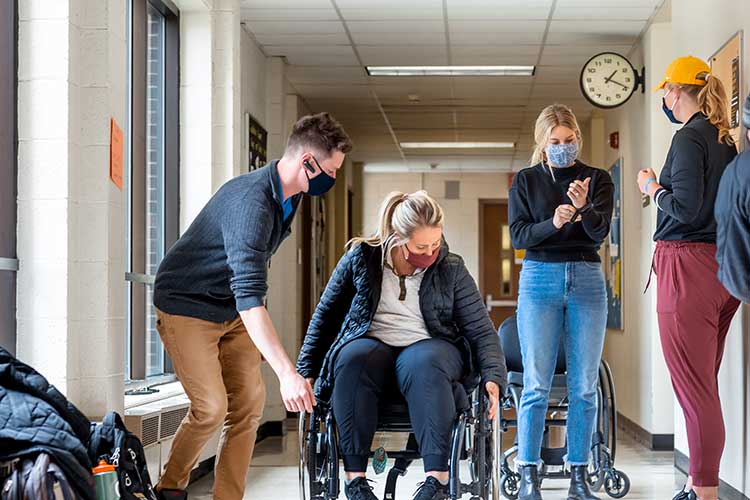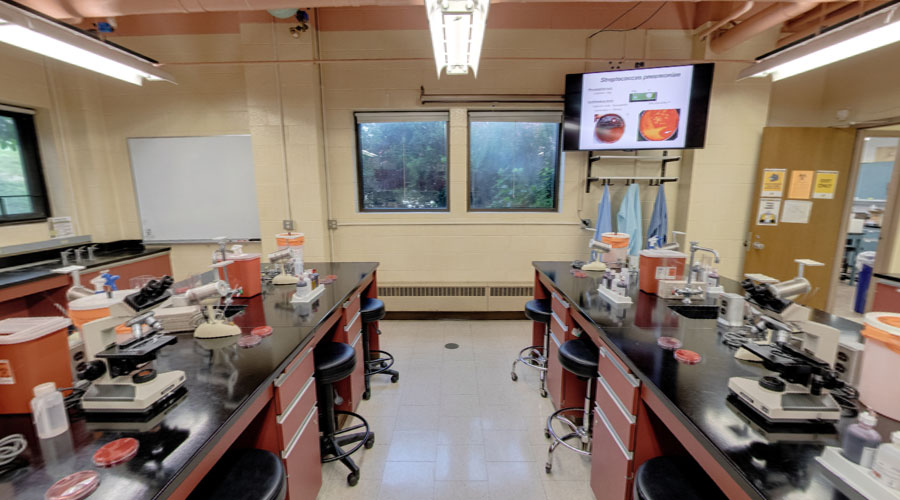Health Sciences PhD
The Health Sciences doctorate program is designed to meet the critical need for doctoral-prepared faculty and researchers in areas such as biomedical sciences, communication sciences and disorders, health informatics, kinesiology, occupational therapy and physical therapy.
Program Type
Doctoral
Program Format
On Campus
Health Sciences PhD Program
You will work closely with research faculty in your selected area of concentration and complete cross-disciplinary courses that emphasize an interdisciplinary perspective in health-related education and research. Your independent research and dissertation will be structured according to your area of specialization.

- Only a handful of universities nationwide offer a health sciences doctorate, and UWM offers the only such program in the state.
- The diversity of our programs, faculty and their research will allow you to develop interdisciplinary perspectives to broaden your scientific approach.
- Many of our students publish in peer-reviewed journals and present at national and international conferences before graduation.
- All of our graduates have found employment within their chosen field, going on to a variety of faculty positions, postdoctoral fellowships and industry jobs.
Successful Alumni
The School of Biomedical Sciences & Health Care Administration has many successful alumni. These alumni have taken their degrees and have excelled in their careers.
Visit our Alumni page and be inspired by where a health sciences degree can take you.
Prior to admission to the Health Sciences doctorate program, an eligible College of Health Sciences graduate faculty member must agree to serve as your major professor.
You must first meet the admission requirements of the UWM Graduate School. In addition to UWM Graduate School requirements, you must be prepared to meet the following requirements:
- Submit GRE scores taken within the last five years.
- Hold one of the following and submit transcripts:
- Master’s degree or equivalent in an area that provides foundational academic preparation in the proposed PhD health sciences area of concentration.
- Bachelor’s degree with exceptional promise, as indicated by research experience/evidence of writing or an undergraduate project, recommendations, GRE scores and undergraduate GPA.
- Log into the University of Wisconsin – Milwaukee Graduate School application page to create your account and application.
- Submit a sample of writing that demonstrates your ability to conduct research and/or the ability to critically analyze the scholarly work of others.
- Submit a reason statement outlining your academic and professional background, declaration of area of concentration, as well as specific research interests and goals for the program. This statement should be uploaded to your PhD in health sciences application.
- Identify a faculty mentor with a similar research interest and an active research program. This faculty member must agree to serve as your major professor.
- Submit three letters of recommendation from individuals familiar with your intellectual achievement and potential. At least two of these letters must be from faculty or senior administrators at academic institutions.
If you are from a country other than the United States and your first language is not English, a score of at least 250 on the computer-based (or 600 on the paper-based) Test of English as a Foreign Language (TOEFL) is required. A score of 6.5 on the International English Language Testing Systems (IELTS) examination will be accepted in lieu of the TOEFL.
The PhD Steering Committee will make an admission recommendation, and the final admission decision is contingent upon approval by the departmental Graduate Faculty Committee or Executive Committee, the applicant’s major professor and the UWM Graduate School.
Program of Study
The Health Sciences doctorate program requires you to complete a minimum of 72 credits beyond the bachelor’s degree, including no more than 36 credits from a related master’s and/or other post baccalaureate coursework. Depending on area of concentration, additional credits may be required. Consult with your major professor for individual program of study requirements. You must complete a minimum of 36 credits, or 50% of the total credits required for the degree, in doctoral status at UWM, including pre-candidacy and candidacy work.
Of the credits taken in residence, you must complete at least eight graduate credits in each of two consecutive semesters, or six or more graduate credits in each of three consecutive semesters, exclusive of summer sessions.
The precise number of credits and actual course requirements will be determined after review of your previous coursework by your major professor and the program director. You will then plan an individual program of study in consultation with your major professor and doctoral advisory committee that will include a set of core courses, an area of concentration, cross-disciplinary courses, electives and the dissertation.
Core Areas (18 Credits)
| Research/Grantsmanship | 3 Credits |
| Teaching | 3 Credits |
| Statistics | 6 Credits (Min.) |
| Seminar | 3 Credits (Max.) |
| Elective in Research, Teaching, or Statistics | 3 Credits |
| Total Credits | 18 Credits |
would need prior approval from their major professor and program
director for any courses not included in Appendix II. (3) For some core
courses, the course number will change depending upon the department
through which the course is offered during a particular semester.
Area of Concentration (minimum of nine credits)
Courses related to the area of concentration will require you to draw upon the strengths and expertise of the faculty and curriculum in an interdisciplinary and collaborative manner.
Cross-Disciplinary Area (minimum of six credits)
Cross-disciplinary courses are courses in areas outside of your area of concentration but related to your cross-disciplinary focus.
Electives (10 credits)
Elective courses are courses relevant to your program of study.
Dissertation (minimum of 12 credits)
The last component of the degree requirements, independent research and dissertation, will be structured by your area of concentration. Your dissertation is to consist of focused, independent research that contributes to the existing body of scientific knowledge. Per the UWM Graduate School policy, exactly three dissertation credits may be taken in a given semester. Thus, a minimum of four semesters of dissertation work is required.
Initial Program of Doctoral Study
In consultation with your major professor, you will be responsible for preparing an Initial Program of Doctoral Study Form upon admission to the program. The major professor and the program director must approve this form prior to your first semester of coursework.
Approval for Transfer Credits
A list of your previously completed courses and associated credits for transfer into the Health Sciences doctorate program should be submitted with your Initial Program of Doctoral Study Form for approval by the program director. The Office of Graduate Studies will retain a copy of this list.
Formal Program of Doctoral Study
Upon completion of no more than 12 credits, you will be required to prepare a Formal Program of Doctoral Study Form in consultation with your major professor and doctoral advisory committee. Your major professor, doctoral advisory committee, and the program director must approve this form before you will be allowed to enroll in any coursework beyond the initial 12 credits.
Annual Progress to Degree
The CHS Office of Graduate Studies will evaluate your progress on an annual basis against the most current version of your program of study form and Annual Progress Report on file with the Office of Graduate Studies. This evaluation will be provided to you and your major professor for review and signatures. Any corrections to this evaluation need to be coordinated with the Office of Graduate Studies.
Doctoral Milestones
The online doctoral milestones system (uwm.edu/graduateschool/doctoral-milestones) replaces the previous paper form process used by the Graduate School for students to obtain their prelim and dissertator status. If you have already received your dissertator status with the paper forms, please do NOT use this web app unless your program requires you to have your doctoral dissertation proposal hearing after you receive dissertator status and you are filling out that form.
Doctoral milestones are designed to help guide the way through your program by measuring your academic knowledge, preparing you to conduct original research, and write and defend a dissertation of your own original work, all within the timeline established by your program and the graduate faculty leadership at UWM. Individual programs design each milestone in the way that works best for their students and discipline, but all students must meet the basic guidelines established here.
There are several major doctoral milestones that the online doctoral milestones system should be used to complete:
• Application for the Doctoral Preliminary Examination
• Entering Committee Members
• Doctoral Dissertation Proposal Hearing Form
• Application for Doctoral Dissertator Status
• Application for Doctoral Dissertator Defense
Additional information regarding the course of study can be found in the UWM Academic Catalog.

